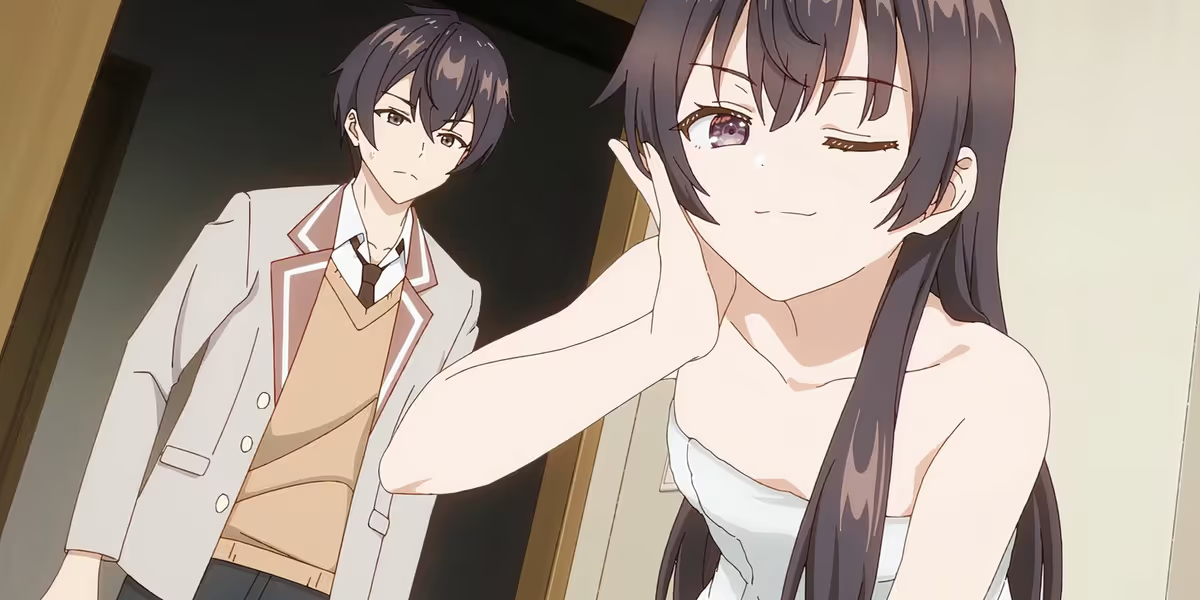The Fantastic Villain Setup of Alya Sometimes Hides Her Feelings in Russian
I'm pretty sure the Anime and Manga Club and the UoA Film Society are out to kill me now.

WARNING: Spoilers for season 1 of Alya Sometimes Hides Her Feelings in Russian and Gone Girl. Alya is available on Crunchyroll, and Gone Girl is available on Netflix and Disney Plus. You have been warned!
After seeing the Tarantino-esque foot scene from Alya on the Crunchyroll Instagram account, I knew I had to check out that anime immediately. What began as a standard rom-com with Yuki's insanity turned into a family drama that slowly curdled into something so much bigger. That was so interesting that it got me to watch Hereditary. And this is not a joke: I genuinely found the family drama gripping; dealing with divorce, disownment, and the kindness we seek from our patriarchs, who only see us as bricks in a wall. Now that's alliteration and a reference in one sentence.
What I found especially fantastic was how the show sets up the ultimate antagonist for the series: the otaku Yuki Suou, not because of her qualities as a villain, but because of how the show sets us up for it. It does so by taking our expectations of this genre and using them against us, much like David Fincher and Gillian Flynn did with Gone Girl. It should be no surprise that it is one of my favorite films of all time. You can see a parallel between this anime and Gone Girl in how Yuki Suou and Amy Dunne act. They both manipulate the people around them with such mastery that they can even fool us, the audience.
Genre Expectations
From the pilot episode with the Tarantino-esque foot scene, you know you are in for a wild ride. You have a cold princess who confesses her love for a boy in Russian, an otaku in the student council who is seemingly aware of the fourth wall, and let's not get into the hypnosis scene in episode 9. It's a wild show. And it numbs us to all the other insanity the show throws at us.
Throughout the show, we get hints that Yuki may be putting on a front. She is a master manipulator, after all. She knows how to convince people; hence her former position as student council president, with her being a strong candidate for this one. The US presidential election made me truly realize the sheer power good marketing can have, and Yuki is a master marketer. She doesn't just sell the characters in the show that she is dignified, only letting go once all the curtains are closed. She sells us that that's all there is to her. We, the audience, are conditioned into believing that she's just the comic relief, incestuous otaku of the traditional romcom, despite knowing that this was going to be anything but normal. Emphasis on the word "just."
We already see the building blocks to the morphine overdose in episode 11. She's crafty and a master at pushing people into uncomfortable situations. Think about her humiliation tactics towards Alya, even when no one of interest is looking. The "mapo tofu" scene comes first to mind, and later, a confrontation scene with her pressuring Alya into admitting her feelings for her, even if Alya goes about it in a roundabout way. This hints at a potentially personal vendetta against her already. We also know she must be a master manipulator and marketer to be able to maintain her reputation, being the former president and a strong candidate for this year's election.
But it goes beyond that: she's familiar with the genre this anime is dabbling in, and will sometimes break the fourth wall, pointing out genre conventions like the "whoops I walked in while you were showering and now the audience can see you naked for the mandatory fanservice" scenes by pointing out the steam censors, much like Fight Club did with its "cigarrete burns" when both the Narrator and Tyler Durden describe the latter's life to us. Helps that David Fincher directed both that and Gone Girl.
She's not just manipulating the people around her that she's just a crazy little sister. She's manipulating us, too.
You can draw parallels between Yuki and Amy in Gone Girl: she's smart (graduated from the Ivy League), cunning, and experienced with how people behave (she wrote personality quizzes for magazines). But there's also the genre itself: we immediately assume that maybe Nick murdered Amy, especially given all the flashbacks regarding their previous years of marriage. It helps that Ben Affleck is usually seen as a "strong, tough guy" thanks to his breakthrough role as Batman in the DC Snyderverse. We have expectations for what this kind of film will show us, which makes the halfway twist hit so much harder when we see that Amy faked her death through one of the coolest monologues and montages I've ever seen. All the building blocks we saw are used, but recontextualized in such a drastic manner that it feels massive.
And Amy, in her plan, had this in mind. Wisecrack's Earthling Cinema puts it best: "The truth doesn't matter. All that matters is a good story." And Amy gave the media all the classic hallmarks of an abusive husband, from signs of a struggle with messily cleaned blood to a boosted life insurance policy, and even when things went awry and she was forced to meet with Desi Collings, eventually murdering him, she still kept the media in mind. They immediately spin the story into one of a jealous ex who kidnapped this woman all for himself, leading her to murder him to be able to escape, completely forgetting the fact that they had just spun a story of an abusive husband who murdered her beloved wife.
Checkbox Drama
Starting at the halfway point, we start diving into Yuki's side of the family and establish her history under an emotionally abusive grandparent post-divorce. Without knowing, we are given her driving mission: to be number one in anything and to best Masachika in everything. But we dismiss it as what I like to call "checkbox drama": drama that's just added into a romcom because that's the kind of thing that happens. We dismiss it even more when Yuki proceeds to smother her face into her maid's breasts (I can't believe that's an actual sentence that makes sense in context), and it strengthens the idea of this being "checkbox drama" because it's immediately undercut with a "comedic" moment.
Without us noticing, or with us disregarding that drama, we have been fed all the seeds needed for Yuki to blossom into the main antagonist of the series going forward. And it's not until the drugging scene followed by the radio gambit in the finale that we realize our expectations have misled us, and that in reality, all those little things; her eccentricities, her over-the-top horniness going above and beyond the "imotou" trope, were all just bricks in the wall to hide her true self from us. And by the time she tears down the wall, a monster is unleashed.
Luck was on this anime's side too: this was coming out at a season when the "little sister" characters were more prevalent, even in Makeine, my personal favorite from that season. It became so easy to categorize Yuki as "the queen of little sisters", and I think it did a great job of misleading the audience without the show even needing to do anything, even in the marketing via word of mouth. The show gave us the Lego pieces, we simply arranged them in one way until the show revealed they made up the Death Star, ready to destroy everything in its path.
It's the same with Gone Girl, too: Nick's cheating with his 17-year-old student proves to be much more massive, not just in potentially (and eventually) tanking his reputation in the overall case, but also providing a strong motive for Amy. It starts in the beginning, with her parent's "Amazing Amy" book series. The overall deteriorating financial condition and Amy having to bail them out with her money also add to it, on top of Nick moving them back to Missouri from upstate New York, combined with Amy's overall pride, gives us perfect seeds for a revenge.
At first, we think it's just a classic "oh their marriage is falling apart", although Gone Girl does do this aspect better because it directly and immediately impacts the story and investigation. But for now, all the pieces lead us to think that Nick murdered Amy, not that Amy escaped and framed her husband for murder as revenge over the 5 years of hell she went through in their turbulent marriage.
That is fantastic writing on a meta level: it takes what the audience expects from an anime likes this, and misleads you with it by hiding its foreshadowing within the genre expectations and hiding it under "mandatory" checkbox drama, so that you don't realize what has truly happened until it's too late, and a morphine overdose has happened. I cannot wait to see how they take this character and the conflict with the later seasons, especially now that I hear volume 9 of the light novels amps up this family drama even more to the point that Ari Aster must have written it.
One More Thing
Now, there are two possible things regarding this theory.
- This was all a deliberate writing choice.
- I have been watching too much Black Mirror now that season 7 is out and rewatching Gone Girl, which led me to crafting insane theories like this. I may also have decided to watch Hereditary and Midsommar back to back.
And while option number 2 may be objectively correct, option 1 is the more fun option, which means to me, it's the right option.
Anyways, I'm gonna start proofreading my death certificate on the chance that the Anime and Manga Club and Film Society are out to kill me now.





